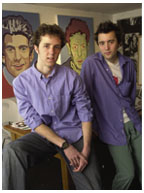February 26, 2003: Notebook
SUBJECT
MATTERS
The class: Aircraft design
War
in the Middle East
How one professor sees the situation facing the U.S.
Student start-ups: from business plan to the real world
ItÉs not your fatherÉs Princeton

The class: Aircraft design
Imagine Princeton students designing a supersonic business jet. It happens in Associate Professor of Mechanical and Aerospace Engineering Luigi Martinelli *87’s class, where students act as a design team working for an aircraft manufacturer.
The first step for the students is to come up with several designs that meet required specifications. Then the 26 students split into groups, each taking one of the conceptual designs and developing a detailed model of what the plane will look like and how it will be put together. In the end, the students produce a design that focuses on the aircraft’s aerodynamics and structural qualities.
Along the way, students learn about the trade-offs aircraft designers face — between the aerodynamic performance of a wing versus its weight, for example — and create extensive design iterations to find the best compromise.
Martinelli introduces the students to state-of-the-art design tools that he has developed, including computer programs to compute the aerodynamic forces on planes.
“Teaching design is challenging,” says Martinelli, because “design is more an art than science. I aim at teaching the proper aeronautical design techniques while not suffocating creativity.”
Louise Conroy ’03, a mechanical and aerospace
engineering major, hopes to learn more about the process of designing
a complex system by working in a hands-on group environment. “The
best way to do something is in a team environment, and that seems to be
the focus of this class,” she says. ![]()
By K.F.G.
Reading list: D. P. Raymer, Aircraft Design: A Conceptual Approach; T. H. G. Megson, T. U. G. Megson, Aircraft Structures for Engineering Students; E. F. Bruhn, Analysis and Design of Flight Vehicle Structures


How one professor sees the situation facing the U.S.
Photo: Michael Doran *97, assistant professor of Near Eastern studies, argues that Palestine-as-place has yielded to Palestine-as-symbol. (frank wojciechowski)
Michael Doran *97, assistant professor of Near Eastern studies and an adjunct senior fellow at the Council on Foreign Relations, published an article in the January/February issue of Foreign Affairs magazine in which he argues that war against Saddam Hussein is justified because he represents a “direct threat that must be countered firmly and effectively.” In the same article he argues that the Palestinian cause has become “protean” — that Palestine is not regarded merely as a place, but as a powerful symbol. The Palestinian flag has come to represent a stand against the status quo, and not just in the Middle East.
Doran is the author of Pan-Arabism Before Nasser: Egyptian Power Politics and the Palestine Question (1999), and last semester he cotaught The Historical Roots of the Bin Laden Phenomenon. Here he talks with PAW’s Lolly O’Brien.
What is the state of anti-Americanism in the Arab world today?
There are two schools of thought. One school says that anti-Americanism is a result of American policies, in particular, support of Israel, sanctions on Iraq, and support for corrupt regimes.
I belong to a second school, which basically sees anti-Americanism and also anti-Israeli feeling as to a certain extent a reflection of hostility to the status quo in general.
For instance, populations have been exploding throughout the Arab world. And economies are not growing fast enough to keep pace with the rising populations. People’s dissatisfaction with the status quo translates into anti-American feeling, because America is seen as the guarantor of the status quo.
In your article in Foreign Affairs, you write, “If an American road to a calmer situation in Palestine does in fact exist, it runs through Baghdad.” Could you talk about that?
I think that what we’re witnessing in the Middle East, the deepest sources of anti-Americanism are beyond policy. In the article I give the example of the Al Jawf region in Saudi Arabia, where they are carrying off protests against the law on behalf of Palestine. And you have to ask the question, why does the Al Jawf region feel particularly strongly about Palestine? You don’t have protests in Riyadh. There is no doubt that people are upset about Palestine — but that’s not an explanation, because pro-Palestinian feeling is common throughout the Arab world. So you ask what’s different in Al Jawf, and what’s different in Al Jawf is that it is a miserable place. And the people are impoverished and alienated from the central government. So is it Palestine that they are most concerned about, or their own home?
You point out that the idea of “Palestine-as-symbol” has been used by groups wholly unrelated to Palestinians. An example was in Northern Ireland last summer when the Irish Republican Army raised the Palestinian flag over Republican strongholds.
It’s because for many around the world this flag now expresses simple anticolonial defiance. It’s a protest by those who believe their native rights have been trampled under the boots of foreign rulers. The Ulster Unionists, by the way, countered by flying the Israeli banner over their neighborhoods.
Last April, there was a little intifada in Antwerp at the time when the Israelis were reoccupying the West Bank. The protest was in the name of Palestine, but the primary concern of these people, which they expressed explicitly, is the status of Muslims in Belgium. And if you look, you see that they are mainly unemployed Moroccans. The Moroccan unemployment rate in Belgium is about 30 percent as opposed to a 10 percent general Belgian unemployment rate. Again, it’s an example of Palestine-as-symbol.
The cause of Palestine expresses local grievances because in Arab political discourse the maltreatment of the Palestinians signifies the prejudice of the West against all Middle Easterners. Palestine is the only Arab land successfully colonized in modern times, a fact that rankles deeply. A lot of people in the Middle East think that the Western powers planted Israel in the Arab world and then nurtured it with the intention of using the Jewish state as a bridgehead for dominating the entire region. For many Arabs, the history of Palestine is not just the story of two peoples struggling for the same land, but rather evidence that shows the real and nefarious intentions of the West toward Arabs and Muslims in general.
What do you see as the first steps in resolving issues in the Middle East?
The U.S. needs to topple Saddam Hussein sooner rather than later. The U.S. needs to get involved in state building in Iraq for the long haul. There’s no quick fix. The president has to prepare Americans for the fact that there is no quick fix, which he began to do in the State of the Union address. And after toppling Saddam Hussein, the president should launch a serious Arab-Israeli peace initiative.
What do you expect the U.S. to accomplish in Iraq?
There’s every reason to believe a war is going to be short. We’re much stronger than we were in 1991, so the combination of a weaker Iraqi army and a stronger U.S. means it should be fast. God willing, Saddam Hussein won’t use any chemical or biological weapons successfully, or if he does he’ll use them sparingly. So assuming that it’s rather quick and there aren’t a lot of casualties, which is already a large assumption, then the U.S. will begin some sort of reconstruction. What exactly that process is going to look like is not clear.
With a U.S. presence in Iraq, who in the Middle East will react the most strongly?
Disaffected people everywhere where America is seen as the guarantor of the existing order will react strongly. I suspect there will be serious demonstrations in Jordan, Egypt, and possibly in Saudi Arabia. If the war is quick and if there are not a lot of casualties, then the demonstrations will lose steam, much as they did after the United States went into Afghanistan. If it’s quick, I think that Iraqis in general are going to be dancing in the streets.
Do other states want Saddam to go?
They would like him to evaporate. Nobody is shedding
tears for him, the man. But they don’t like to see so much American
power right on their borders. ![]()
A longer interview appears on PAWOnline, click here.


Start me up: Entrepreneurs Jon Beyer ’05, left, and Tom Szaky ’05 in their TerraCycle offices in Princeton.(Frank Wojciechowski)
Student entrepreneurs at Princeton are learning what it takes to start a company in the post-Internet boom days.
In its fifth year, the Princeton Business Plan contest gives enterprising students the resources to take an idea and develop it into a full-fledged business plan. Venture capitalists and entrepreneurs, several of them alumni, mentor the students during a four-month process, culminating this year on February 22.
With the high-flying days of venture capital and Internet startups gone, the current batch of student entrepreneurs are focused on products and technology rather than Web sites.
“The plans have gotten more complex,” says Philip Michaelson ’03, president of Princeton’s 250-member Entrepreneurship Club, which sponsors the contest. “The proposals offer a new service, product, or technology.”
Among this year’s dozen entries are three medical software proposals, a database software product that would help government agencies link up with nonprofit social service agencies, and a biotechnology proposal that uses a digital processor to align DNA sequences faster than is currently possible, for which graduate student Aaron Spatzer has applied for a patent, says contest codirector Jerome Ku ’05.
Darren Hammell ’01, a member of the team that won in 2001, says the contest was an excellent “first step” into the world of raising financing and developing all facets of a business plan, which later became the basis for his company, Princeton Power Systems, Inc. The company, founded by Hammell and partners Erik Limpaecher ’01, Mark Holveck ’01, and John Lerch ’01, offers power conversion technologies that improve the quality of electricity and is now working on a system that would connect power sources such as wind turbines and solar cells to utility grids.
One of last year’s winners has an office on Nassau Street in Princeton. TerraCycle International, Inc., founded by Jon Beyer ’05 and Tom Szaky ’05, is a startup company that uses technology to replicate and enhance the natural process of recycling waste, which includes the use of red worms. The company signed a contract late last year through which it will receive 130 tons of food waste daily from clients in New Jersey.
“Our technology has proven to be a dramatic improvement over traditional composting, which takes more than nine months,” explains Beyer, the company’s vice president of technical development. TerraCycle’s process, which is odorless, takes only eight days.
Contest judges this year include Arthur Klausner
’82, Kef Kasdin ’85, and Dan Von Kohorn ’97. First-prize
winners get $5,000; second prize, $3,000; and third prize; $2,000.
![]()
By A.D.

The Board of Trustees approved a 4.8 percent increase in undergraduate tuition for 2003—04, a 5 percent increase in room, and a 1.8 percent increase in board, bringing the cost of a Princeton education to $36,649, or 4.5 percent higher than last year.
Tuition will now be $28,540, room $4,109, and board $4,000. Graduate student tuition also rises 4.8 percent to $28,540.
Last year, the overall increase was 3.94 percent in undergraduate fees, and 4.1 percent in graduate fees.
Provost Amy Gutmann said that the university’s
financial aid budget will be increased to cover the additional charges
for students on aid. This year, 50 percent of the members of the Class
of 2006 receive financial aid. ![]()


 It’s
not your father’s Princeton
It’s
not your father’s Princeton
As part of the Board of Trustees’ Alcohol
Initiative, the Office of Communications, working with the Office of Health
Services, has produced a series of posters to discourage undergraduates
from inappropriate alcohol consumption. The poster on the left, prepared
in time for this year’s sign-ins and bicker period, shows a filthy
toilet with the headline “Insert Diploma Here.” On the right,
a stomach pump lies at the ready under the words “You Don’t
Want to Know What This Is.” The verdict is still out on whether the
poster campaign is effective.
![]()

Photos: princeton communications
 The
Rev. Sue Anne Steffey Morrow, associate dean of religious life and of
the chapel, will step down from her post at the end of the academic year
in June to pursue several academic projects, including a biography of
the Rev. Dr. Edmund Steimle ’30. Morrow came to the university in
1981 as an assistant dean of the chapel and in 1988 served as acting dean
of the chapel. She was promoted to her current position in 1989.
The
Rev. Sue Anne Steffey Morrow, associate dean of religious life and of
the chapel, will step down from her post at the end of the academic year
in June to pursue several academic projects, including a biography of
the Rev. Dr. Edmund Steimle ’30. Morrow came to the university in
1981 as an assistant dean of the chapel and in 1988 served as acting dean
of the chapel. She was promoted to her current position in 1989.
Two years ago, Princeton’s Bendheim Center for Finance began offering a master’s degree in finance, and last spring graduated its first four students. This year, the program’s director, Yacine Aït-Sahalia, expects 27 students to graduate with an M.Fin. Aït-Sahalia says the program, which can take as few as two semesters or as many as four, depending on the student’s background and credits, deals with “problems that are clearly real, and we teach sophisticated analysis that has practical applications.”
 Georgia
Nugent ’73, dean of the Harold McGraw Jr. Center for Teaching and
Learning, has been named the 18th president of Kenyon College, effective
July 2003. Nugent earned her Ph.D. in classics from Cornell in 1978 and
has taught at Brown and Princeton, where she was named associate provost
in 1995. She became dean of the McGraw center in 2001.
Georgia
Nugent ’73, dean of the Harold McGraw Jr. Center for Teaching and
Learning, has been named the 18th president of Kenyon College, effective
July 2003. Nugent earned her Ph.D. in classics from Cornell in 1978 and
has taught at Brown and Princeton, where she was named associate provost
in 1995. She became dean of the McGraw center in 2001.
Gabor Katona, a second-year graduate student in the Program in the History of Science, died January 20 in an apparent suicide. Before coming to Princeton, Katona received master’s degrees in philosophy and aesthetics from the University of Pecs in his native Hungary. He already had published a book and several articles.
 Eugene
McPartland, a former naval commander who was the university’s vice
president for facilities operations from 1983 to 1999, died January 6;
he was 68.
Eugene
McPartland, a former naval commander who was the university’s vice
president for facilities operations from 1983 to 1999, died January 6;
he was 68.
Dean of Admission FRED HARGADON, who plans to retire in June after 15 years at Princeton, will be the speaker at this year’s Baccalaureate service on June 1. Hargadon was invited by President Tilghman on the recommendation of the leaders of the senior class.
In August, he accepted responsibility for “inappropriate actions” of admission office staff members who accessed a Yale University Web site without authorization.
Class president Catherine Farmer ’03 wrote in a classwide e-mail that Hargadon was chosen because he “knew our class very well” and that he would “bring us a message someone from the outside wouldn’t be able to give to us.” Hargadon is considered a national leader in college admissions, and is known for giving personal attention to each applicant.
As of February 5, 53 members of Princeton’s
faculty have signed an Internet letter opposing a “U.S. Invasion
of Iraq.” Available at www.noattackiraq. org, the letter was written
by faculty members at the University of Minnesota and spread to other
universities, and eventually was posted on the Web by faculty members
at M.I.T. ![]()
